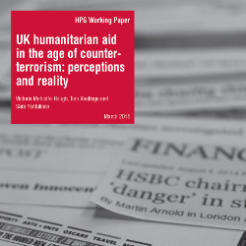There is a "genuine risk" of charities being used for terrorist purposes, but that risk has been exaggerated in a way that has caused lasting reputational damage, according to a report published today.
Today's report by the Humanitarian Policy Group (HPG) of the Overseas Development Institute (ODI) claims there is a “lack of proportionality” from all sides when discussing British charities’ links to extremism.
The paper, entitled UK Humanitarian Aid in the Age of Counter-Terrorism: Perceptions and Reality, claims there is a "genuine risk" that British international non-government organisations (INGOs) could be abused for extremist or terrorist purposes "but the risk has been overstated by some interested parties".
The paper says that reported cases of charities’ extremist abuse, though small in number, has led to “serious reputational damage” to the voluntary sector as a whole, HPG claims, and has “undermined public confidence in charities", particularly those providing emergency relief to civilians affected by conflicts and other crises in the Middle East.
But the paper also says the impact of counter-terrorism restrictions against British charities has been exaggerated by some voluntary organisations.
“Counter-terrorism measures are having a tangible impact on British INGOs, particularly their access to financial services, but the scale and breadth of that impact have been exaggerated or generalised by some in the INGO sector,” the report says.
“The lack of proportionality in discussing this issue is fuelling negative perceptions on all sides, which is in turn hampering efforts to address it.”
More measures to minimise abuse
HPG calls for British Muslim charities working in conflict areas to make greater efforts to minimise the risk of extremist abuse.
The report outlines two categories of risk factors for abuse - those that can be addressed “by improved governance, such as fraud and money laundering” and “those that are inherent in the provision of aid in high-risk conflict contexts, such as theft of aid or attacks on staff or premises, which can be managed but are difficult to minimise significantly due to the nature of the operating context”.
According to HPG, reputational damage to Muslim charities has resulted in some charities struggling to access financial services - resulting in a direct impact on aid operations.
“Delayed transfers, bank closures or other restrictions placed by banks and other entities on the financial services they offer INGOs are, in some cases, having a direct impact on aid operations, including curtailing or closure of projects and delayed salary and supplier payments,” the report says.
“More generally, banks’ demand for more and more documentation from their INGO clients is cumbersome and taking up staff time and resources.”
But HPG claims that in many cases, the perception of the risk of terrorism is greater than the actual risk itself. In particular the report says the debate on the impact of counter-terrorism overshadows more frequent occurrences of fraud, poor governance and money laundering, unrelated to terrorism or extremism.
Clearer guidelines
The report recommends the Charity Commission produce “additional guidance for British charities raising funding for aid operations in Syria, highlighting the risks and the support the Commission can provide”.
It also urges the regulator to take a vocal approach in defending charities against unfounded allegations.
“Noting the damage that can be done by unfounded allegations… the Commission could consider speaking out in the media more actively in cases where it has found no evidence to substantiate such claims or in defence of charities which have been subject to abuse by others, and positively affirm the lifesaving work they are carrying out,” the report recommends.
On the back of the report John Low, chief executive of the Charities Aid Foundation, also urged the treasury to produce clearer guidelines for charities working in areas at perceived risk of terrorist links.
“Without clear, Treasury-approved guidance covering this area, charities will suffer as banks try to reduce their risks in complying with regulations simply not written with charities in mind,” he said.
"We are calling for the Charity Commission to work to create treasury-approved guidance on countering terrorist financing and money laundering, to sit alongside the existing Joint Money Laundering Steering Group (JMLSG) guidance but be focussed specifically on charities, in order to reduce the risks to banks of complying with their legal and regulatory responsibilities.
"Driving charities out of the formal banking system risks driving donations underground, further undermining global efforts to identify and prevent corruption, fraud and terrorist financing."
'Demonstrate confidence in charities'
The HPG report said the government should “consider ways to clearly demonstrate its confidence in British NGOs, particularly in reference to allegations made by foreign governments (or other actors) against DFID partner INGOs and for which no supporting evidence is presented.”
But charities must also improve working practices, the report says, including developing “best practice standards in risk management and due diligence”, inviting third parties to assess their performance and taking a proactive approach with banks, warning them about up-coming transactions that could be viewed as risky.
Sir Stephen Bubb, chief executive of the Association of Chief Executives of Voluntary Organisations, described today's report as a “calm, measured and constructive contribution” to the debate on humanitarian charities’ work in war zones and other difficult environments.
“It’s a clarion call to the government and the Charity Commission to work constructively with charities to ensure the risks in their work are mitigated early and openly,” he said. “Too often, anti-extremism and anti-terrorism regulation is counterproductive when it touches charities, so I hope this report will help reduce such problems in future.”









